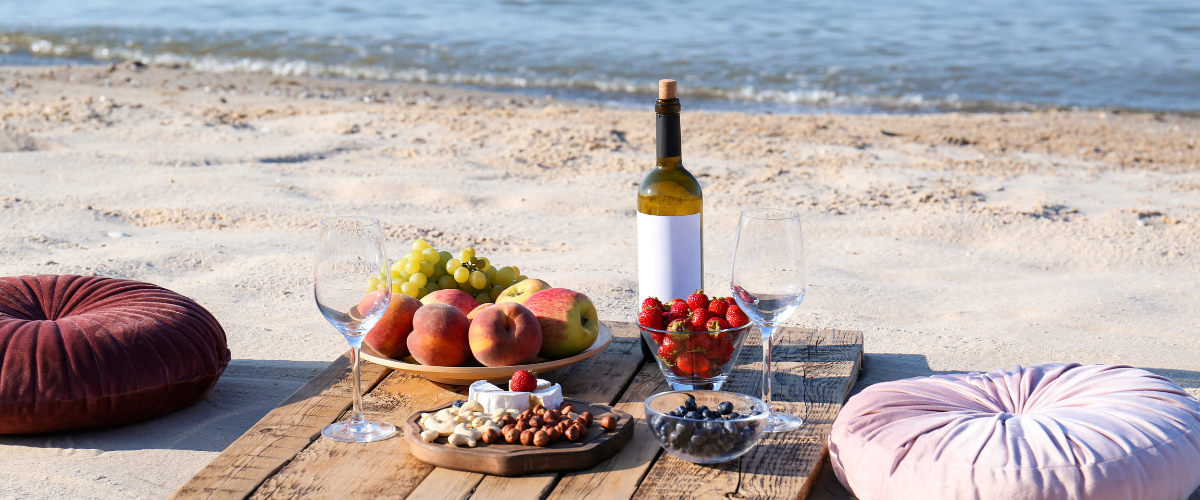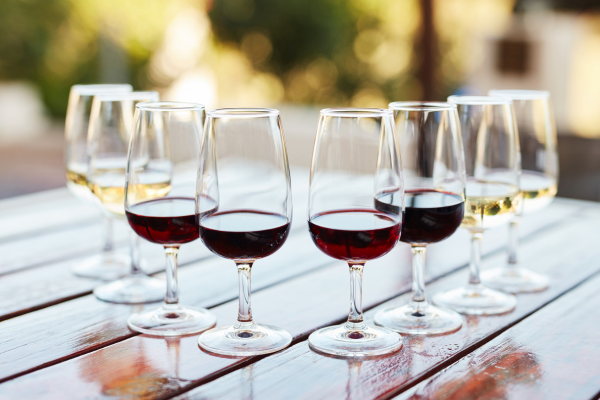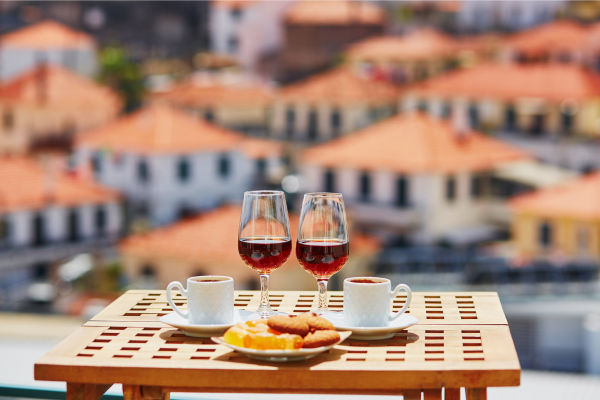Delicious Wine Styles for Summer Sipping

Wines for when the heat is on.
by Erin Henderson
When the sun dial strikes solstice and summer officially kicks in, it’s time to cue the articles about best summer sippers and refreshing hot-weather whites.
That makes total sense: who wants a heavy red in a heat wave? That’s about as comfortable as ordering a rich hot chocolate or dense boeuf bourguignon on a patio in 30°C temperatures. Both are excellent, but maybe later. Like October, later.
However, I tend to resist the trop of whites in summer, reds in winter. Certainly, there wines better suited to the seasons, but it needn’t be that rigorous. Wine is not a one-trick pony.
Related: Great Wines for Grilling
Take a cue from hot weather wine regions: southern Italy, Greece, Spain, South Africa et al. These warm climate destinations produce wines of all styles, including sweet dessert wines like Port, Marsala from Sicily, and Madeira from the Portuguese Island of the same name.
These cultures embrace their wines to work with the food, lifestyle, weather, and special occasions that swirl through these heated places. So since imitation is the sincerest form of flattery, do as they do with these wines and foods that have been proven for centuries what works best to beat the heat.

Take Inspiration from These Places ..
Sicily
The largest island in the Mediterranean Sea, Sicily has average yearly temperatures at 22°C, pushing closer to 30°C throughout the summer. Naturally, seafood and fish favours heavily in the Sicilian diet, as do vegetables and grains, though there is an old shepherding culture throughout the island. It's not uncommon to see goats roaming around the dry island, and of course there are pastures of sheep and cows.
While white wines are grown and happily consumed, red wines are prolific in Sicily (it’s also a summer tradition for Sicilians to float fresh peaches in their red wine.) Nero d’Avola, a deep purple and intensely flavoured wine of spice and juicy fruit, is Sicliy's most popular and widely-planted red grape. This makes a fantatic pairing for earthy meats like goat and lamb grilled over open fire. Nerello Mascalese which is grown mostly on the volcanic slopes of Mount Etna, is elegant and soft, and often compated to Pinot Noir; it's often blended with earthy Nerello Cappuccio for heft. Lovers of oily fish like sardines and anchovies, this is the pairing for you. And Frappato, which has become a bit of a sommelier darling in recent years, is as light as Pinot Noir with tart red fruits and floral perfume. This is a lovely pairing for pasta with garden-fresh tomato sauce.
Santorini
Greece is the birthplace of modern winemaking and has a dreamy reputation for clear, blue skies, piercing, sun-bleached ancient ruins, and, of course, days spent lounging on rocky beaches feasting on freshly caught seafood and watching the cast of Mama Mia high-step on by.
The crisp, white wine Assyrtiko with its salinity-laced freshness, is arguably the most popular grape (and one of my faves), grown all over the country, but noticeably more on Santorini, the poster child for Greek tourism. Salty, citrusy Assyrtiko is refreshing with fresh oysters and brings energy to fish and chips.
Related: Do You Know These Italian Wine Terms?
Spain
With its arid, dry, punishingly hot climate (in summer it’s not uncommon hit 45°C or higher throughout much of the coutry), Spain excels at the intriguing Tempranillo grape. Ranging from juicy and fresh, ruby-red Crianza-style wines, to brooding, earthy, and spicy Grand Reserva that has stuffing to last decades in the cellar, Tempranillo is well suited to the mix of foods found in the Iberian Peninsula. There’s an enticing mix of cuisine, depending on where in the country you find yourself, from smoky chorizo, sweet jamón, and rich rabbit braises, to fresh sea urchin, earthy potatoes, and cooling gazpacho.
Portugal
Porto, Portugal’s second largest city next to Lisbon, is in the country’s far north and, unbelievably, considered “too cold” by many Portuguese who prefer to live further south. Well, I can report that this Canadian was happily sitting on beach in November in that “too cold” city.
Port is just south of Vinho Verde, a wine producing region that grows dozens of red and white grapes but is most popularly known for fresh, bright, and sometimes frizzante whites. Perfect pairings for salt cod fritters, grilled octopus, and the famous Portuguese tomato rice.
Just over the mountains, in the sweltering heat basin of the Douro, that’s where the robust reds for both sweet Port and dry table wines are grown. I find the full bodied red blends of the Douro are stylistic stand-ins for Cabernet Sauvignon, and work beautfully with grilled beef and burgers.

Grapes to Try this Summer
Clearly, the above list is not an extensive one, just a quick sip of examples where those living in warm, or even sufferingly hot, areas seem to get by just fine growing, producing and drinking wines of all styles.
Take a cue from the wine drinking habits of our warm climate friends. Consider doing as they do with some excellent, and often incredibly value-driven, wines. Bonus points for creating a themed dinner with regional dishes.
Chenin Blanc
The leading white grape of sunny South Africa makes wines that are sweet, dry, and sparkling. And, due to a myriad of economic reasons, quality South African wines can be found for bargain prices. A dry Chenin that’s medium bodied, with bright acid and flavours of stone fruit goes beautifully with barbecued chicken, fresh corn, grilled fish with lemon, and spicy foods like Thai, Vietnamese, and Mexican.
Syrah
Syrah is grown in both in France’s Rhône Valley a little further south in Provence. In summer, these areas are hawt.
Provence adds Syrah to its light and bright rosés for thirst quenching refreshment to pair with moules et frites, salad Niçoise, and goat cheeses.
In the northern part of the Rhône Valley, Syrah is kept single varietal (or sometimes a splash of Viognier is added) for a peppery, smoky red, which is terrific with lamb, steak au poivre, or frisée and lardon salad. In the south, where you find Chateauneuf-du-Pape, Syrah is added to a blend for juicy and robust reds and pairs nicely with simply grilled steak, short ribs, and hearty vegetables like mushrooms and eggplant.
Cabernet Sauvignon
Believe it or not, Mexico makes wine – and some excellent bottles at that. Grape vines were first brought to Mexico by the Spanish in the 1600’s, and now nearly 8,000 acres are under vine, mostly in the mountainous northern regions of the country (the flatlands are too hot to successfully grow vines.) Cab Sauv is among the most planted, and is typically rich, ripe and fruit-forward in style. Cabs don’t need much of an introduction to wine lovers, but sip this big boy with grilled duck, smoked brisket, and Moroccan tagines with loads of fresh herbs.

Pinot Noir
Ok, this one’s a curve ball, but I like keeping you on your toes. Germany is the third largest producer of Pinot Noir (called Spätburgunder – or Late Burgundy) in the world.
But wait – isn’t Germany cold?!
Yes, Germany is cool climate. But in the Pflalz – a stunning southern wine region with a microclimate so sunny, dry, and warm it grows fig and lemon trees – makes top quality (even collectable from some producers) Pinot Noir, Pinot Blanc and, of course, Riesling. It’s also one of the world’s leading regions for white asparagus.
Give your Spätburgunder a light chill and serve with grilled squab, salmon steaks, or a mushroom fricassee.
Chardonnay
We can’t really talk about wines from hot places without addressing sunny California. Interestingly, a good portion of the top performing vineyards are located within cool microclimates thanks to the the cold winds blowing in from the chilly Pacific Ocean and the sheltering of the mountain ranges.
Still, when touring California vineyards, I find it best schedule all my tastings in the cool and foggy morning, because, come high noon, the sun is blazing so hot I just want to be by a pool with a cold drink in my hand.
California is synonymous with Chardonnay. From unoaked and crisp to rich and luscious, this white wine works beautifully with summer fare: from fresh oysters and grilled cauliflower to butter-poached lobster and grilled pork tenderloin.

